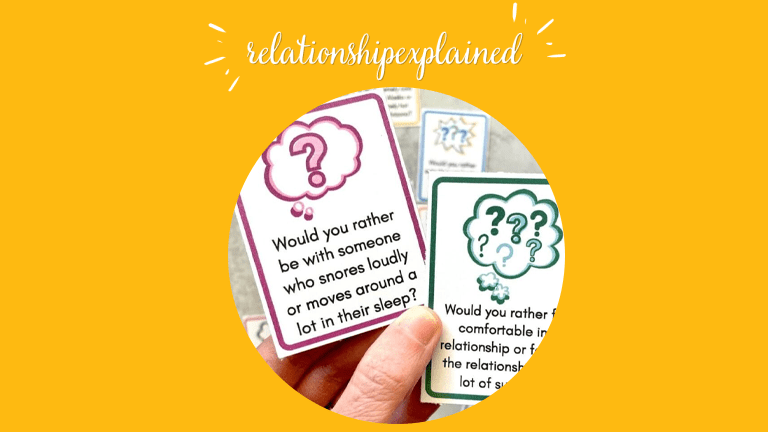Signs You Might Be Dating a Narcissist
Navigating a relationship where one partner exhibits narcissistic tendencies can be incredibly challenging. It's essential to recognize the signs early on to understand the dynamics you might be dealing with. Narcissists often display a grandiose sense of self-importance, a need for excessive admiration, and a lack of empathy for others. These traits can lead to […]
Navigating a relationship where one partner exhibits narcissistic tendencies can be incredibly challenging.
It's essential to recognize the signs early on to understand the dynamics you might be dealing with. Narcissists often display a grandiose sense of self-importance, a need for excessive admiration, and a lack of empathy for others. These traits can lead to a relationship dynamic where your needs and feelings are consistently sidelined in favor of your partner's.
Well, we'll be going over:
- How can you identify if your partner's behavior aligns more with narcissistic tendencies rather than just occasional self-centeredness?
- What strategies can you employ to maintain your sense of self and boundaries in a relationship with a narcissist?
- When might it be necessary to seek external support or reconsider the viability of the relationship for your well-being?
Let's dive in.
Key Takeaways
- Narcissistic personality disorder is a mental health condition that affects a person's ability to empathize with others.
- Identifying Narcissistic Traits is the first step in determining if your partner is a narcissist.
- Recognizing red flags is important to protect your mental health and wellbeing.
Identifying Narcissistic Traits
When you are dating someone, it can be difficult to spot the signs of narcissism. However, it's important to be aware of these traits, as they can be damaging to your mental health and wellbeing. Here are some common narcissistic traits to look out for:
Lack of Empathy
Narcissists often lack empathy, which means they have difficulty understanding and relating to other people's emotions. They may seem cold and distant, and they may not be able to provide emotional support when you need it. They may also be insensitive to your feelings and needs, and they may not take responsibility for their actions.
Need for Admiration
Narcissists have a strong need for admiration and attention. They may constantly seek praise and validation, and they may become angry or defensive if they don't receive it. They may also be preoccupied with their appearance or achievements, and they may use these things to gain attention and admiration from others.
Sense of Entitlement
Narcissists often have a sense of entitlement, which means they believe they are entitled to special treatment and privileges. They may expect you to cater to their needs and desires, and they may become angry or resentful if you don't. They may also disregard your feelings and needs, and they may use manipulation or coercion to get what they want.
If you notice these traits in your partner, it's important to take them seriously. Narcissistic personality disorder can have a significant impact on your relationship, and it's important to seek help if you feel you are being emotionally abused or manipulated. Remember, you deserve to be in a healthy and supportive relationship.
The Dynamics of Dating a Narcissist
Dating a narcissist can be a challenging experience. Narcissists have a grandiose sense of self-importance, a lack of empathy, and a need for admiration, which can make them difficult to be in a relationship with. Here are some dynamics of dating a narcissist that you should be aware of:
Gaslighting and Manipulation
Narcissists often use gaslighting and manipulation to control their partners. Gaslighting is a form of emotional abuse where the narcissist makes you doubt your own perception of reality. They may tell you that you're crazy, that you're imagining things, or that you're overreacting to their behavior. By making you doubt yourself, they gain more control over you.
Manipulation is another tactic that narcissists use to control their partners. They may use guilt, shame, or fear to get you to do what they want. They may also use love bombing, where they shower you with affection and attention to get you to do what they want.
The Cycle of Abuse
Narcissistic relationships often follow a cycle of abuse. The cycle starts with the idealization phase, where the narcissist puts you on a pedestal and makes you feel like you're the most important person in the world. This is followed by the devaluation phase, where the narcissist starts to criticize and belittle you. They may also start to withdraw their affection and attention.
The final phase is the discard phase, where the narcissist ends the relationship. This cycle can repeat itself over and over again, leaving you feeling confused, hurt, and powerless.
Codependency Issues
Many people who are in relationships with narcissists have codependency issues. Codependency is a pattern of behavior where you rely on another person for your sense of self-worth and validation. You may feel like you can't live without the narcissist, even though they're treating you poorly.
Codependency can make it difficult to leave a toxic relationship. You may feel like you need the narcissist to feel good about yourself, even though they're causing you pain.
In conclusion, dating a narcissist can be a challenging and painful experience. If you're in a relationship with a narcissist, it's important to recognize the dynamics at play and seek help if you need it. Remember that you deserve to be treated with respect and kindness in your relationships.
Recognizing Red Flags
If you suspect that you might be dating a narcissist, it's important to recognize the red flags. Here are some common signs to look out for:
Rapid Commitment
One of the early red flags in a relationship with a narcissist is rapid commitment. Narcissists often come on strong in the beginning, showering you with flattery, love-bombing, and attention. They may seem charismatic and charming, and it can be easy to get swept up in their enthusiasm. However, if your partner is pushing for a commitment early on in the relationship, it could be a sign that they are trying to control you or that they are not interested in a healthy, mutually respectful partnership.
Consistent Criticism
Another red flag to watch out for is consistent criticism. Narcissists often have a hard time accepting criticism and may become defensive or angry when confronted with their flaws or mistakes. They may put you down or belittle you, making you feel like you are never good enough. If you find that your partner is consistently critical of you, it could be a sign that they are a narcissist.
Boundary Violations
Narcissists often have a hard time respecting boundaries, both physical and emotional. They may invade your personal space, demand your attention, or make you feel guilty for spending time with friends or family. They may also try to control your emotions, manipulating you into feeling a certain way or making you responsible for their happiness. If you find that your partner is violating your boundaries, it could be a sign that they are a narcissist.
Recognizing these red flags can be difficult, especially if you are in the early stages of a relationship. However, it's important to trust your instincts and take action if you feel like something is off. Remember that you deserve to be in a healthy, respectful relationship and that you have the power to make choices that are right for you.
Impact on Mental Health
Dating a narcissist can have a significant impact on your mental health. Here are a few ways that being in a relationship with a narcissist can affect your mental health:
Self-Esteem Erosion
Narcissists often try to make themselves feel better by putting others down. This can lead to a constant stream of criticism and belittling comments directed at you. Over time, this can erode your self-esteem and make you doubt your own worth. You may start to feel like you can't do anything right and that you're not good enough for your partner.
Emotional Abuse and Isolation
Narcissists may also use emotional abuse to control and manipulate you. They may use guilt, shame, and fear to keep you in line and prevent you from leaving the relationship. They may also isolate you from your friends and family, making it harder for you to seek support and leave the relationship.
If you're in a relationship with a narcissist, it's important to seek help. A therapist can help you work through the emotional damage caused by the relationship and help you rebuild your self-esteem and sense of self-worth. Remember that you deserve to be treated with compassion and respect, and that you have the strength to leave a toxic relationship.
Navigating the Relationship
If you suspect that you are dating a narcissist, it is important to take steps to protect yourself. Navigating a relationship with a narcissist can be challenging, but there are things you can do to improve the situation.
Setting Boundaries
One of the most important things you can do is to set boundaries. A narcissist may try to push your boundaries and make you feel guilty for setting them. However, it is important to stand firm and communicate your needs clearly. You have the right to set boundaries and to expect them to be respected.
Seeking Support
Navigating a relationship with a narcissist can be isolating, but it is important to seek support. This can include talking to friends and family, joining a support group, or seeing a therapist. Having a support system can help you feel less alone and can provide you with the emotional support you need.
Considering Therapy
If you are in a relationship with a narcissist, therapy can be helpful. A therapist can help you navigate the relationship and can provide you with tools to improve communication and set boundaries. Therapy can also help you understand why you may have been attracted to a narcissist in the first place.
Remember, a relationship is a two-way street. It is important to compromise and work together to make the relationship work. However, if you find that the relationship is not healthy and that your partner is unwilling to change, it may be time to consider ending the relationship.
Frequently Asked Questions
What behaviors indicate that my partner may exhibit narcissistic traits?
If your partner is constantly seeking attention, lacks empathy, and is preoccupied with their own achievements, there may be a possibility that they have narcissistic tendencies. Narcissists often display a sense of entitlement, have a grandiose sense of self-importance, and may manipulate others to get what they want. They may also lack the ability to take responsibility for their actions and may blame others for their mistakes.
How does being in a relationship with a narcissist typically affect one's personality and self-esteem?
Being in a relationship with a narcissist can be emotionally draining and can have a negative impact on your self-esteem. Narcissists often put their own needs above others and may belittle their partner's accomplishments or feelings. This can lead to feelings of inadequacy and can cause the partner to doubt their own worth. Narcissists may also use manipulation tactics, such as gaslighting, to make their partner feel like they are crazy or are overreacting.
What are the common patterns of behavior displayed by a narcissist in romantic relationships?
Narcissists often exhibit a cycle of idealization and devaluation in romantic relationships. They may idolize their partner in the beginning, showering them with attention and gifts, but then quickly lose interest and become critical or dismissive. They may also engage in love-bombing, where they overwhelm their partner with affection and attention, only to withdraw it later on. Narcissists may also struggle with commitment and may cheat or engage in other forms of infidelity.
Can you identify the early signs of a narcissistic personality emerging at the start of a relationship?
Some early signs of narcissistic personality disorder may include a lack of empathy, a need for attention, and a tendency to dominate conversations. Narcissists may also be charming and charismatic in the beginning, but may quickly become controlling or dismissive of their partner's feelings. It is important to pay attention to how your partner treats you and others, as well as how they respond to criticism or feedback.
What are the distinctive habits or characteristics of a narcissistic individual in a partnership?
Narcissists may exhibit a variety of behaviors in a partnership, including a lack of empathy, a tendency to manipulate or gaslight their partner, and a need for constant attention and admiration. They may also struggle with boundaries and may become jealous or possessive of their partner. Narcissists may also use their partner as a source of validation and may become angry or dismissive if their partner does not meet their expectations.
How can one differentiate between narcissistic tendencies and normal relationship challenges?
While all relationships have their challenges, narcissistic tendencies often involve a lack of empathy, a need for constant attention and admiration, and a tendency to manipulate or gaslight their partner. If your partner consistently puts their own needs above yours and belittles your accomplishments or feelings, it may be a sign of narcissistic tendencies. It is important to set boundaries and communicate your needs in any relationship, but if your partner is unwilling to listen or respect your boundaries, it may be a sign of a deeper issue.












